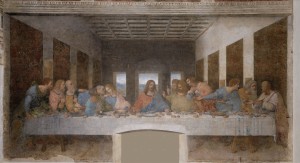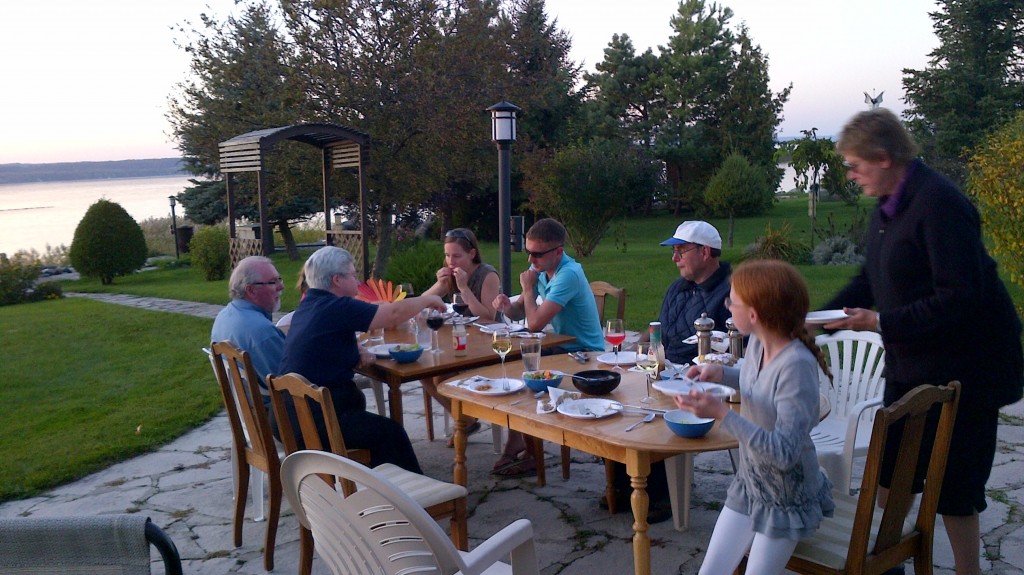I can’t really go on about embracing diversity and dialog and so on without linking to one of my favourite songs ever. The Lost Dogs say it about as well as it can be said:
Efficient Team Building – How Not to Do It.
As I travel around the city of Barrie and witness her different expressions of Christian community, I can’t help but think occasionally about the strange group of followers that Jesus gathered around himself.

You might think, especially if you read a lot of books on ‘leadership’, that Jesus would have had a certain type of person in mind to carry out his mission and vision. Someone who could take orders, but also take initiative, someone passionately devoted to his cause, a quick learner but but also a willing subordinate. And with this ideal in mind, he might have recruited a number of like-minded people who would quickly learn the roles he had in mind for them.
Strangely, Jesus chose to do something completely different.
We are told in Mark 3 that Jesus hand-picked twelve followers from the large crowds that were flocking to his message. So, given that he had far more candidates available than positions to fill, why on earth did he choose such a strange, conflicted bunch?
Let’s consider the political situation at the time. Jesus spent most of his life in ‘occupied territory.’ The situation in 1st century Palestine might seem very familiar to an inhabitant, say, of apartheid-era South Africa, or Soviet-occupied East Germany, or even present day occupied Palestinian territories.
The Jewish nation he grew up in had negotiated an uneasy peace with her Roman overlords, but the threat of violent oppression always remained. Just like in occupied France during the Second World War, different groups responded differently.
The Zealots, for example, advocated violent overthrow of the unwanted invaders. Some might call them freedom fighters, others would call them terrorists. The Sadducees, on the other hand, were consummate politicians. They obtained positions of power under the new regime, ran government departments on behalf of the empire, as well as being responsible for the religious life of the country.
Another group, the Pharisees were more separatist in nature, focussing on maintaining ideological purity against external threats. And finally the Essenes were a kind of monastic movement, choosing to focus inwards on communal, ascetic, living.
And into this complex, politically charged environment, Jesus started to talk about a new king, a new empire, a new way of life. And to spread his message, he recruited a ‘team’ consisting of some very weird characters indeed.
There was Simon Peter, the laborer. A leader, a hothead, just as quick to rush into situations as he was to desperately try to extricate himself from them when they got difficult.
Alongside him was his brother Andrew. Very different in temperament, he was a devout spiritual seeker and evangelist.
Another contrasting pair of brothers was also recruited. James, the fanatic, the troublemaker and eventual martyr; and his brother John, who devoted his life’s energies to calling the fledgling Christian community to live in love and harmony.
Yet more contrasts: we see James and Jude, traditional Jewish names, but also Philip, a Greek name, and someone who is recorded as connecting the Greek community to Jesus. A mediator, perhaps, who could stand up for the needs of a minority community.
In Nathaniel, we see a devout, observant Jew. In Thomas, we meet a fatalist and a skeptic, and yet also someone who, once he found the proof he needed of Christ’s claims, would travel further than any of his contemporaries to spread the message.
Stirring things up even more, Jesus saw fit to recruit Simon the ‘Zealot.’
Today, he’d either be known as ‘Simon the Patriot’ or ‘Simon the Terrorist’, depending on how you viewed the Roman occupation. One person who would definitely use the latter term would be another recruit, Matthew.
Matthew, the tax collector. Matthew, the tool of the occupation. Matthew the collaborator. The guy who had made a tidy profit from working hand in hand with the military force that Simon had dedicated his life to overthrowing.
I’m sure Simon and Matthew had very intense conversations around the campfire at night. Maybe Jesus had a sufficiently mischievous streak to send them out together when he assigned the disciples to work in pairs?
And then, finally, Jesus recruited his team’s accountant.
Judas Iscariot.
It’s very clear that Jesus never read a book on management theory.
Whatever he was looking for in followers, it clearly wasn’t bland uniformity.
And God said “Are the Steaks Ready Yet?”
So, yesterday I was treated to what I like to call the Basic Evangelical Tithing Sermon, or BETS. You’ve probably heard it yourself a few times, if you’ve moved in evangelical circles. Many churches will trot it out once a year or so. It tends to annoy me, because it tends to conflate a quite reasonable review of the church’s financial situation with a bundle of guilt and some really bad hermeneutics.
I was going to write an angry point-by-point refutation of the BETS, but a cooler head than mine suggested otherwise.
So instead, a brief thought on the subject of tithes.

If we’re going to talk about tithing, then we can’t really avoid Deutronomy Chapter 14, where the Israelites are instructed by their God that it was their sacred duty to have the mother of all barbecues every year.
I’m serious. Go read it.
It’s a fascinating chapter. The first third is all about the importance of finding a good Kosher supermarket in your neighbourhood. The last paragraph is about how it’s a good idea to take care of those on the edge of society: the immigrant, the orphan, the single parent. And in the middle section of the chapter the Israelites are explicitly commanded to to spend one tenth of their yearly incoming on “cattle, sheep, wine or beer” or anything else that they liked, and eating together in one big annual party.
A tenth of your household income. Maybe 5 or 6 thousand dollars for a typical Canadian family. On a barbecue. That’s a lot of steak and Molsons! And this isn’t just a backyard get-together, the entire country was supposed to get in on this. It makes Burning Man sound kinda tame.
Apparently, when God talks about tithing, he talks about barbecues.
The Family of God
For a long time I’ve liked to use the analogy of a family when describing the Church.
We know about families. We have brothers, sisters, in-laws, uncles, stepsisters, grandparents, cousins.
Some we like a lot. Some we don’t know so well. Some we find, frankly, weird. Some we don’t even talk to any more.
The church can be like that. Many of us have a ‘home’ denomination. We feel safe there. We’re surrounded by people who are like us. We understand the language that is used. We know what is expected of us. We know what to expect.
Perhaps we’re aware of ‘sibling’ churches. Not quite like us, but similar. We can get along ok. We wish they’d change a few things, but we tolerate their quirks.
Perhaps, though, we also have an estranged ‘parent’ church. A group or denomination that we split away from. For some the split happened amicably, but for others it was a wrenching, violent, argument. Maybe the split happened last year, or maybe it was centuries ago. In both cases the wounds can still be felt.
And then there are those cousins that we’ve never met. Those strange folks that we’ve heard are somehow related to us, that we’ve seen in pictures, but we really know nothing about. They might even speak a different language. Their practices are different. They’ve focused on different elements of the faith than we have. We might have a lot to learn from each other, but no one seems to be in a hurry to even start the conversation.
Maybe this describes you. It certainly describes me. But there’s something else I’ve learned, too.
I have never regretted reaching out to my family.
Frequently I have found them strange, different, weird, frustrating. But just as frequently I have learned something important from them. And just like my physical family, which is spread across the globe, I know I have a deep and profound connection to my distant brothers and sisters in the faith. A connection that transcends language, culture and geography.
So I’m committed to seeking out the links that connect us. Our shared faith, our shared heritage, our shared hope.
Because even if you’re weird, and do things differently, and speak a strange language, doesn’t mean you’re not family.